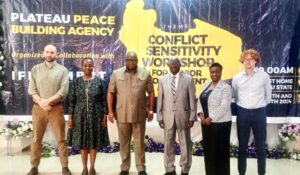 Plateau State Governor, Barr. Caleb Mutfwang, Chairman of MBBT, General Martin Luther Agwai (retd) and others in a group photograph during the engagement in Miango Rest House, Jos.
Plateau State Governor, Barr. Caleb Mutfwang, Chairman of MBBT, General Martin Luther Agwai (retd) and others in a group photograph during the engagement in Miango Rest House, Jos.
Okomaje Ocheme,Jos
Recently, while Plateau State Government officials were gathered at the Miango Rest House in Bassa LGA for a two-day conflict workshop and retreat, words filtered in that a bomb had exploded at the Terminus Area of the state capital, Jos.
The development was enough to throw the entire state into panic as any upheaval within the Terminus Area is seen as a deliberate provocation given that it is a highly densed market place.
There was panic across the country as major news outlets screamed about the explosion that had just rocked Jos City, and online media platforms and social media were rebroadcasting it with reckless abandon.
Surprisingly, the reaction of Jos residents to the incident turned out to be different. Unlike previous situations where everyone would hold the other responsible which often resulted in clashes, Jos was calm.
This time, people waited to confirm if the story was true and to give the authorities the benefit of doubt before taking any action.
Rather than pounce on one another on the basis of suspicion, there was caution and circumspection which paid off as it was later discovered that the news about the bomb blast was a false alarm.
The patience saved Jos and the entire state from another round of violent conflict, proving, according to observers, that the constant sensitisation programmes and moral lessons by various bodies on how to manage conflict have started yielding results.
For nearly two decades, since 2001, Plateau suffered many crises, leaving the government and people to explore various means of bringing about peace, and which led the government to set up a peace-building agency to address the issue of violent conflicts.
Our correspondent reports that since the establishment of the Plateau Peace Building Agency (PPBA) in 2016, it has been working with a wide range of stakeholders to address the multifaceted challenges of peace and conflict that the state has been confronted with.
Earlier in the year, a peace groups, the Middle Belt Brain Trust (MBBT), was in the state and it’s Chairman, General Martin Luther Agwai (Rtd), had discussions with the Governor Caleb Muftwang on the possibility of imbuing citizens, especially officials of government, on the new approaches to conflict prevention.
Incidentally, it was while the MBBT workshop and retreat to institutionalise conflict sensitivity in policy making and implementation for government officials was holding at Miango, that the bomb scare occurred.
Governor Mutfwang who was at the retreat, took the opportunity to address the matter, describing the report as fake, while assuring the people that all was in place to ensure calm and normalcy.
He said: “But it was good that people were sensitive, that they saw an object and they suspected that this object should be investigated. I think that is part of what we are called to do in society.
“Let’s be sensitive to things around us. Let’s be sensitive to movements around us. Let’s be sensitive to comments around us. We’ve been able to nip a lot of potential disaster by picking up credible intelligence …. But we must also be responsible, particularly in the use of social media.”
General Agwai on his part, acknowledged that the world was facing numerous conflict challenges and that people had become copycats of violent acts.
He lamented that due to these, resources that would have been used to advance the development and comfort of the people were diverted to resolving conflicts.
He said, “It is for this reason the Middle Belt
Brain Trust (MBBT) was formed: to mitigate contemporary conflict and governance challenges concentrated in Benue, Kaduna, Nasarawa, Plateau and Taraba states.”
Harping on the need to prevent conflict, he said a United Nations and World Bank report on preventing conflict concluded that: “For each $1 invested in prevention, about $16 is saved down the road,” stressing that for these reasons, the MBBT was focusing on key medium-term structural and institutional challenges on the Middle Belt’s violence and future prospects of peace and prosperity.
Our correspondent took reactions from people about how a major conflict was averted in Jos despite the bomb scare.
A woman who was around the Terminus Area on the morning of the bomb scare, Mrs Hannatu Bitrus, said she did not panic when she heard that a bomb had exploded because they’d been told at a women’s group meeting to be cautious of such information.
She said, “If it were before, we would have been running up and down, but because our leaders have spoken to us on how to treat such news, I waited and I’m happy it turned out to be fake.”
The Director General (DG) of the Plateau Peace Building Agency, Julie G Sandra, on her part emphasised on the need to prevent conflict and why government officials must be involved.
She said this was because given the cross-cutting nature of peace and conflict, there’s a need to mainstream conflict sensitivity in government business at all levels.
She said, “This is more so in view of the fact that many challenges of insecurity are conflict-related or fall within the purview of peace and conflict thematic area.”
